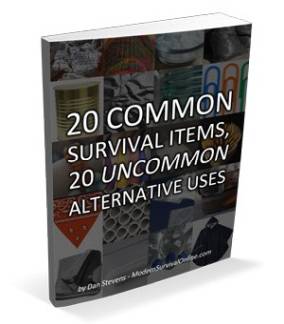by L.B.
I’ve always been a planner.
When I was a teenager, a tornado struck my hometown. My parents and siblings raced for the tornado cellar, and I walked calmly but quickly through the house, grabbing our first-aid kit, a jug of water, and a box of granola bars from our kitchen. My mother hollered at me for not running, until my little brother got overexcited and tripped, scraping up his knee on the unfinished, filthy cellar floor. Suddenly that first-aid kit was a good idea — and that was even with no one seriously hurt.
The fact is that some kind of disaster is going to strike your life at some point, and you need to start thinking now about your survival plan. If there were a fire in your home right this moment, what would you do? Do you and your family have a designated meeting location outside? Are there safety ladders installed near every upstairs window? Does everyone in your family know how to access alternate exits if the main door is inaccessible?
And that’s just fire safety, one of the barest minimal plans you need to have at the ready. What are you going to do if an intruder enters your home? If the tornado sirens go off? In my short life I’ve lived through three major disasters: the tornado mentioned earlier; a flood situation in which the levee burst and we had, at most, fifteen minutes to get to high ground; and an unexpected earthquake. Every time, I had a plan.
The truth is that no matter what disaster you’re planning for, you need to have a plan at the ready and you need to be in control of your plan. Shaun Ward, the founder of Vestguard and the man behind ballistics protection vests that have twice won the Counter Terror and Specialty Security Award for innovation in Personal Protective Equipment, has this to say about planning:
Many people will have an opinion on your plan, and while it is essential to listen to these comments and reflect upon them, it is also remember to believe in that initial vision you had.
What does that mean? Here’s an example. People on this summer’s Asiana flight 214 got considerable flak for taking wallets, purses, and carry-ons with them when they evacuated the plane. Reflecting on those comments means yes, when there’s a plane evacuation, you can’t be mucking around in the overhead compartments. Believing in that initial vision you had means boarding the plane with the idea that if things go down, you have your wallet, ID, phone, and other essentials at your fingers, ready to shove in your pocket and go. Not 30 seconds. Two seconds. A true planner simply keeps those items in her pockets during takeoff and landing.
That’s how security planning has to work: it has to be instantaneous and automatic. Do you know where your wallet is right now? How about your passport? Or your first-aid kit? Suppose you had to evacuate your home in five minutes. Or two minutes. Do you know how to grab the essentials, like good walking shoes, clean socks, and non-perishable food? Do you know which backpack you’d use? Do you have a backpack pre-filled, ready to carry to the tornado cellar or to the flood evacuation site or anywhere else you need to go?
The other part of planning is that you have to share your plans with your family and loved ones. My mom has four kids. Imagine if all four of us had been in the kitchen grabbing food instead of heading towards the tornado cellar. Make sure everyone knows that if there is a crisis, one person grabs the backpack and the other person grabs the dog. Practice your plan until you have it right.
Now it’s your turn. What are your plans for life’s emergencies? Have you ever put a plan into action? Remember: plans help people survive.

Like what you read?
Then you're gonna love my free PDF, 20 common survival items, 20 uncommon survival uses for each. That's 400 total uses for these dirt-cheap little items!
We will not spam you.
Without going into details, if we had to leave, we have a 5 minute plan, 15 minutes, 30 minutes and longer plans.
We have lists on the wall in the pantry, everything in place and accounted for and locations noted in the lists.
If we were to stay we have most, if not all, situations covered for ourselves for long term scenarios.
Everyone needs to think about what life was like before we had conveniences like electricity, gasoline, automobiles, etc. Could you make it as our grandparents, and those that came before them, or any of our ancestors did? Have you thought of their lives, how they lived, what they did in day to day, year to year life?
We do not have a bug out plan solidified, we need to work on that. But we are good to go with bugging in. IDK what we’d do if a fire happened. My first grab aside from all family members is photos, which I know is NOT a priority, but I know exactly where they are…that and important documents…We def need to work on this!
We live in Florida, where hurricanes are frequent, and bad storms in general in the summer. Each person in our family has a bug out bag in their car. We have a list of what to do for hurricanes, staggered depending on the anticipated strength. One list for category 1, additional items to add for category 2, additional items for category 3, and what to take when we evacuate for more than that.